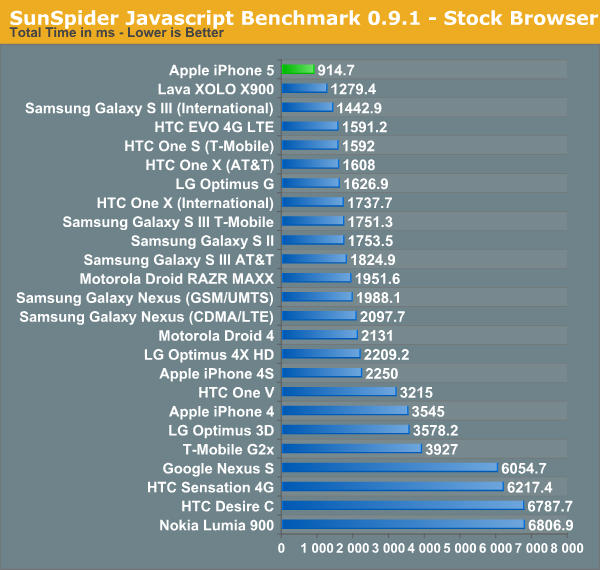
In the long list of critters you probably don’t want to meet, there’s the Sun Spider. Not a true spider, but it sits somewhere between a spider and a scorpion. Pretty cool looking critter, as long as it’s on a screen. Enough about spiders.
A couple of days ago, rumours circulated that the A6 chip in the new iPhone 5 was faster than current high-end Android devices, with a leaked GeekBench result showing some impressive figures. The iPhone 5 easily outpaced the Samsung Galaxy S III and Nexus 7, however this was with a caveat: the Galaxy S III was running Ice Cream Sandwich. With Jelly Bean, the Galaxy S III would take back the upper hand.
Further testing — using a different tool known as SunSpider — has shown that the iPhone 5’s A6 chip might have the edge over other devices by other measures too. SunSpider (note, the lack of space between) is a JavaScript benchmarking tool which is used to determine real world browser performance, and of course, the underlying power of the hardware on which the browser is run.
Using SunSpider, AnandTech obtained results showing the iPhone 5 took the lead at 914.7ms (the lower, the better), ahead of an Intel XOLO X900 chip and a quad-core Samsung Galaxy S III, which scored 1279.4ms and 1442.9ms respectively. For those that would like a bit of a snigger, however, you can find the iPhone 4S and iPhone 4 much further down the rankings with 2250 and 3545ms respectively.. much slower.

AnandTech wrote:
SunSpider is quickly outlasting its welcome as a smartphone benchmark, but it does do a great job of highlighting issues with the Cortex A9′s memory interface. Intel originally hinted at issues in the A9′s memory interface as being why Atom was able to so easily outperform other ARM based SoCs in SunSpider. As we surmised in our A6 Geekbench post, it looks like Apple specifically targeted improvements in the memory subsystem when designing the A6′s CPU cores. The result is the fastest SunSpider test we’ve ever recorded on a smartphone – faster even than Intel’s Atom Z2460.
This doesn’t tell us much about the A6′s architecture other than it’s likely got a better cache/memory interface than ARM’s Cortex A9.
Despite the differences, I find myself wondering about their real-world significance when it comes to usability and speed. I’ve used some of the higher-rated smartphones on the list, including the Galaxy S II and Galaxy S III, HTC One X, and a Galaxy Nexus, as well as the two iPhone variants that performed worse, the iPhone 4 and iPhone 4S.
Quantitatively, these are all slower than the iPhone 5, but qualitatively, is the difference even noticeable?
In my experience, I’d say “not really”. The Galaxy S III in particular is buttery smooth, and anyone who’s used one (on Ice Cream Sandwich or Jelly Bean) can attest to that experience. If the iPhone 5 is 400ms faster, does it make it a better handset? By this measure alone, I’d still say no — browser performance is just one part of the package, and doesn’t mean all that much when it comes to other performance, such as battery life, usability of non-browser apps, and the general usability of the phone.





Given that this is a Javascript test it’s almost entirely meaningless anyway, “Native” applications are written in Objective-C or Java/C for iOS and Android respectively. Javascript is used within the browser, and the reason a website may appear slow rarely has anything to do with Javascript, it’s mostly about network connectivity. A more meaningful test would test 3D physics, 3D rendering, 2D rendering, floating point operations etc. Whilst these tests would be more meaningful in general, it still largely depends on how you use your device, and perhaps more importantly, how applications are written. For example, for an application to… Read more »
Exactly right @google-2fa633c466363d5ae365a4aa98125bae:disqus – the only people who really care about benchmarks are spec wonks. For the end-user, the handset that’s best is the one that meets their needs best.. and for that, it’l largely come down to taste and preference, not raw performance.
I use my S2 for quite a bit of web browsing on the run, and a better score in Javascript performance usually translates to a smoother browsing experience for myself.
Having said that, we are getting to the point of these phones being better by only a fraction of a second. This is also a test meant to really load the phone with tasks to do, so to me its indicative that there is no real benefit forking out a lot of money if you are looking for speed in the browser department, because its improvement will only be marginal.
If GS3 and One X run on Jelly Bean and using Chrome, the result will be different.
Just got 1222.8ms with my s3 running cm10-20120926-nightly(jelly bean) on stock browser, 1363.6ms on chrome.